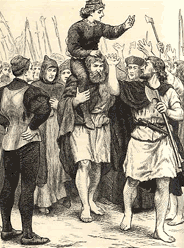Walter Fitzsimon
Walter Fitzsimon (died 1511) was a statesman and cleric in Ireland in the reign of Henry VII, who held the offices of Archbishop of Dublin and Lord Chancellor of Ireland.
Walter Fitzsimon | |
|---|---|
| Born | Dublin |
| Died | 1511 Ireland |
| Nationality | Irish |
| Occupation | Irish statesman and cleric |
| Known for | Lord Chancellor of Ireland from 1496–98 |
Biography
He was born in Dublin, the son of Robert Fitzsimon and his wife Janet Cusack. He had close links to the Anglo-Irish nobility through his sister Alison, who married as his third wife Nicholas St Lawrence, 4th Baron Howth; after Lord Howth's death Alison remarried into the influential Plunkett family.
Fitzsimon was precentor of St Patrick's Cathedral in 1476, and consecrated Archbishop of Dublin in 1484. He was Lord Deputy of Ireland 1492–94 and Lord Chancellor of Ireland 1496–98. He died at Finglas in 1511.[1]
Career
Like most of the Anglo-Irish nobility (except his brother-in-law, Lord Howth) he made the mistake of supporting the claim of the pretender Lambert Simnel to the English throne, and was present at his coronation in Christchurch Cathedral, Dublin. After the crushing of Simnel's cause at the Battle of Stoke Fitzsimon was pardoned and played a prominent part in the ceremony by which the Irish nobles expiated their treason. Soon afterwards he quarreled with the Earl of Kildare, the dominant figure in Irish politics, and the moving force behind the Simnel rebellion, and with Kildare's father-in-law, Lord Portlester. Thereafter the Archbishop was considered a reliable supporter of the Tudor dynasty. It may well have been his influence which prevented a later pretender, Perkin Warbeck, from gaining significant support in Ireland.

Lord Deputy
In 1492 he became Lord Deputy of Ireland [2] and convened a Parliament at Dublin which was largely devoted to annulling measures previously taken against him by his main political rival, Baron Portlester. He saw himself as a social reformer, and persuaded the King to take stern action against beggars: he argued that most of them were perfectly well able to work but preferred to live on charity. The King agreed, and orders were accordingly issued that no one be permitted to beg without a certificate from the appropriate local authority. Further, a workhouse was to be built in every parish for vagabonds to work in.[3] At the same time he urged that the younger sons of the nobility should be encouraged to learn a useful trade rather than live off their parents.[4]
Lord Chancellor
He was Lord Chancellor of Ireland from 1496–98; there is some doubt as to whether he resumed the office at a later date. O'Flanagan states that he was a diligent Chancellor, but this did not lead him to neglect his duties as Archbishop.[5] He held a synod in Dublin in 1494 and in 1497 granted the Dean of St Patrick's Cathedral licence to build a hospital at Kevin Street for the poor people of Dublin, who must however be able to satisfy the Dean that they were good Catholics of blameless life and of English origin. He made some efforts to revive the almost moribund Medieval University of Dublin (not to be confused with Trinity College, Dublin), by imposing a levy on the clergy to provide salaries for the lecturers.
In his later years he spent much of his time at the English Court, and despite his previous support for Lambert Simnel he seems to have enjoyed the trust of King Henry VII. O'Flanagan tells the story that the King asked Fitzsimon what he thought of a recent sermon preached by one of the Royal chaplains: the Archbishop said frankly that it was unduly flattering of the King. The King, highly amused, replied that this was his opinion also.[6]
Character
Ball describes him as a man of remarkable strength of mind and body and one of the most learned men of his time.[7] O'Flanagan calls him a man of great gravity and learning.[8]
See also
References
- Ball, F. Elrington The Judges in Ireland 1221–1921 John Murray London 1926
- Chrimes S.B. Henry VII Yale University Press 1999
- D'Alton, John Memoirs of the Archbishops of Dublin Dublin Hodges and Smith 1838
- D'Alton Archbishops of Dublin
- O'Flanagan J. Roderick Lives of the Lord Chancellors and Keepers of the Great Seal of Ireland 2 Volumes London 1870
- Lives of the Lord Chancellors
- The Judges in Ireland
- Lives of the Lord Chancellors
| Catholic Church titles | ||
|---|---|---|
| Preceded by John Walton |
Archbishop of Dublin 1484–1511 |
Succeeded by William Rokeby |
| Political offices | ||
| Preceded by Henry Deane |
Lord Chancellor of Ireland 1496–1498 |
Succeeded by William Rokeby |